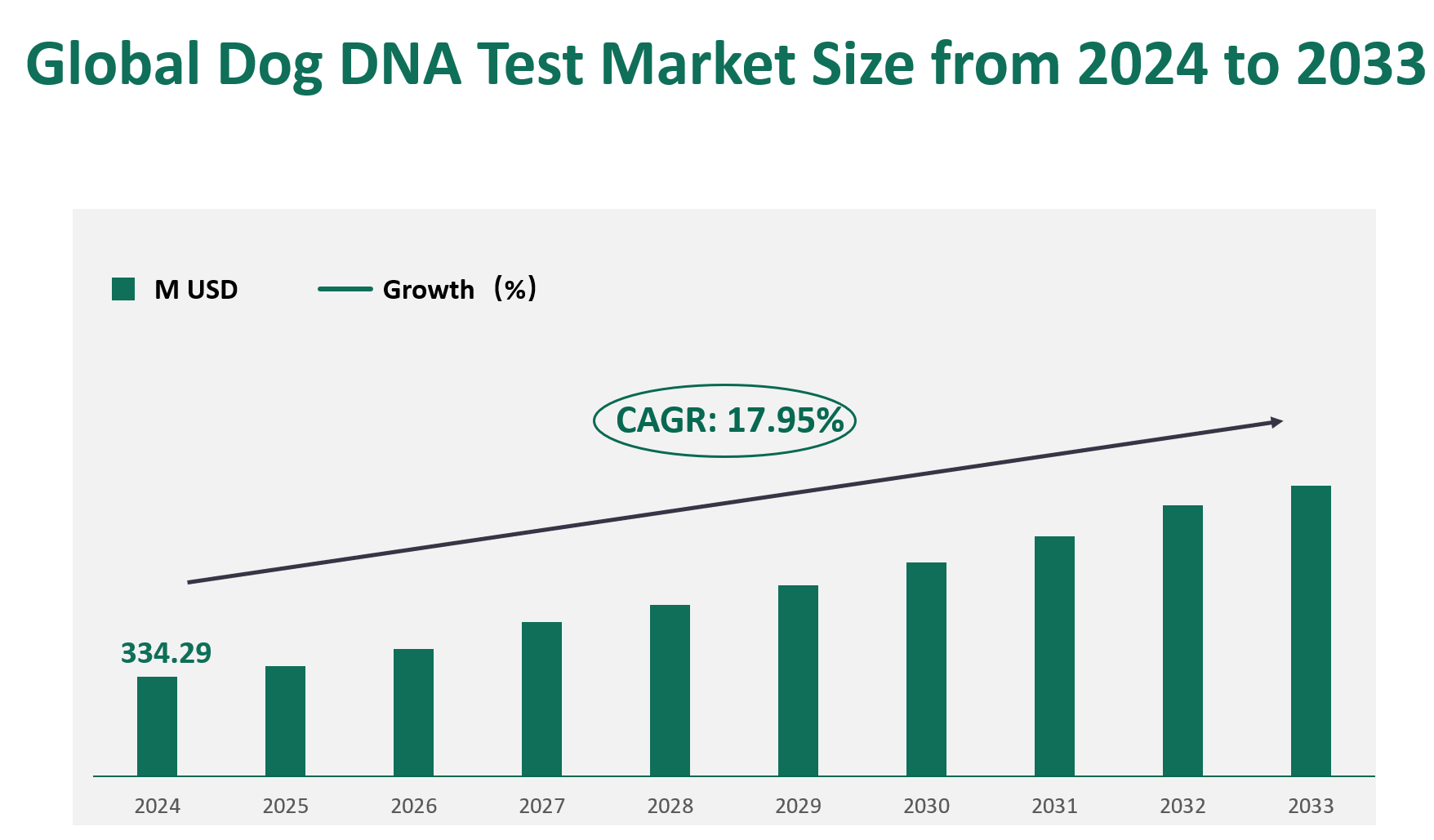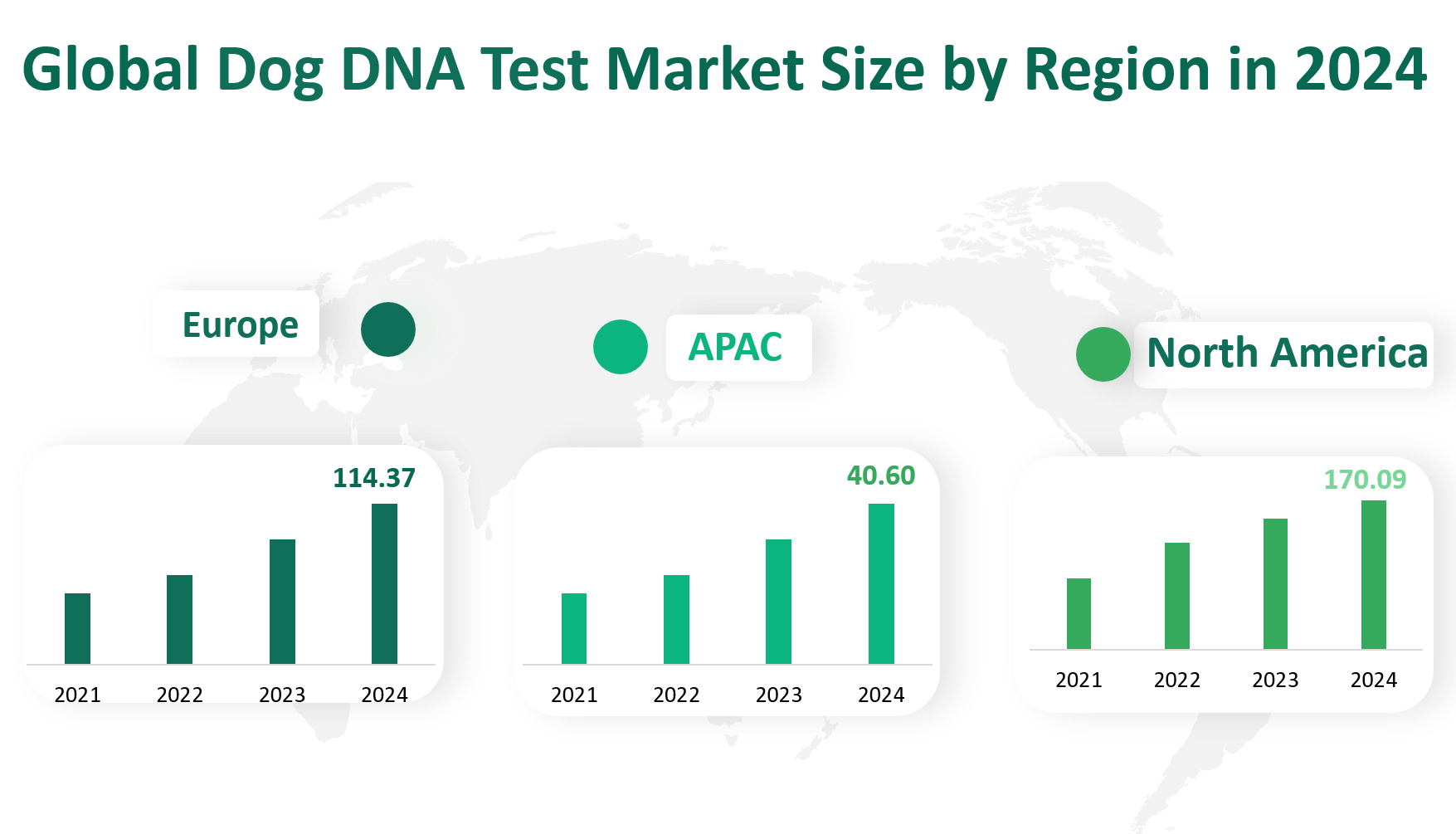1. Global Dog DNA Test Market Insight Analysis
In 2024, the global Dog DNA Test market value is estimated to reach 334.29 million USD, with a Compound Annual Growth Rate (CAGR) of 17.95% from 2024 to 2033.
Dog DNA tests are innovative tools that allow dog owners to gain a deeper understanding of their pets’ genetic makeup. These tests can reveal a dog’s breed composition, ancestry, and potential health risks. They are typically conducted using saliva or stool samples, which are analyzed in specialized laboratories. The primary applications of Dog DNA tests include in-store testing and mail-in testing, with the latter becoming increasingly popular due to its convenience. The tests can identify over 210 genetic health conditions, providing pet owners with actionable insights to enhance their dogs’ health and well-being. This comprehensive information not only helps in understanding a dog’s lineage but also aids in making informed decisions regarding diet, exercise, and medical care.
Figure Global Dog DNA Test Market Size (M USD) and CAGR (2024-2033)

2. Driving and Limiting Factors of Dog DNA Test Market Growth
The growth of the Dog DNA Test market is driven by several key factors. Firstly, the increasing number of pet dogs globally has led to a higher demand for genetic testing. According to recent data, there are approximately 471 million pet dogs worldwide, with 90% of American households considering dogs as part of the family. This trend is further supported by the growing awareness of pet health and the desire to provide better care for pets.
Additionally, advancements in genetic testing technology have made these tests more accurate and accessible. The implementation of relevant laws, such as those requiring DNA testing for abandoned dog droppings in Ireland, has also contributed to the market’s expansion.
However, the market also faces certain limitations. One of the primary challenges is the intense competition among industry players. Companies are constantly striving to improve their products and services to gain a competitive edge.
Another significant challenge is the accuracy of test results. While many manufacturers claim high accuracy rates, some veterinarians and genetic experts remain skeptical due to the lack of peer-reviewed research on the testing processes. The impact of the COVID-19 pandemic on production and supply chains has also affected the market, although the industry is gradually recovering with the adoption of more automated production lines.
3. Technology Innovation and Corporate Mergers and Acquisitions in Dog DNA Test Market
Technological innovation is a key driver of the Dog DNA Test market. Companies are continuously investing in research and development to improve the accuracy and scope of genetic tests. For instance, Wisdom Panel has developed a new breed detection system using AI, which offers comprehensive genetic testing for dogs. Embark Veterinary, another major player, has launched a DNA test for purebred dogs, providing unique health insights that can be shared with veterinarians. These advancements are not only enhancing the value of Dog DNA tests but also expanding their applications.
Corporate mergers and acquisitions are also shaping the market landscape. For example, NEOGEN Corporation acquired Genetic Veterinary Sciences, Inc. (dba Paw Print Genetics) in December 2021. This acquisition has strengthened NEOGEN’s position in the companion animal genetic testing market. Such strategic moves allow companies to expand their product portfolios, enhance their technological capabilities, and reach a broader customer base. Additionally, the development of e-commerce platforms has facilitated the distribution and accessibility of Dog DNA tests, further driving market growth.
4. Global Dog DNA Test Market Size by Type
Dog DNA tests are designed to provide valuable insights into a dog’s genetic makeup, breed composition, ancestry, and potential health conditions. The two primary product types in the market are Saliva Tests and Stool Tests.
Saliva Tests are the most common type of Dog DNA Test. These tests require a simple mouth swab from the dog’s cheek to collect saliva containing DNA. The collected sample is then analyzed to determine breed composition, ancestry, and potential health risks. Saliva Tests are highly accurate and provide comprehensive results, making them popular among pet owners and veterinarians.
Stool Tests, on the other hand, involve analyzing a dog’s fecal matter to obtain genetic information. While less common than Saliva Tests, Stool Tests can be useful in certain scenarios, such as identifying the source of dog waste in public areas or for specific health-related analyses.
In 2024, Saliva Tests are expected to maintain their dominant position, driven by their accuracy, ease of use, and comprehensive results. The market size for Saliva Tests is forecasted to be around $279.30 million, with a compound annual growth rate (CAGR) of 18.69% from 2024 to 2033.
Stool Tests, while less prevalent, are also experiencing growth. The market size for Stool Tests in 2024 is projected to be around $55.00 million, with a CAGR of 15.00% from 2021 to 2028. Although Stool Tests have a lower market share compared to Saliva Tests, they are still an important segment within the industry, particularly for specific applications such as waste management and health monitoring.
Table Global Dog DNA Test Market Size by Type in 2024
5. Global Dog DNA Test Market Size by Application
The applications of Dog DNA Tests can be broadly categorized into two main segments: In-store Testing and Mail-in Testing.
In-store Testing involves taking the dog to a physical location, such as a veterinary clinic or a pet store, where the DNA sample is collected and analyzed on-site. This method is convenient for pet owners who prefer immediate results and personalized consultations with professionals.
Mail-in Testing, on the other hand, allows pet owners to collect DNA samples at home and send them to a laboratory for analysis. This method is more flexible and convenient for pet owners who prefer the comfort of their own home. Mail-in Testing kits usually include detailed instructions and materials for collecting and mailing the sample.
In 2024, Mail-in Testing is expected to maintain its dominant position, driven by its convenience, flexibility, and cost-effectiveness. The market size for Mail-in Testing is forecasted to be around $281.40 million.
In-store Testing, while less prevalent, is also experiencing growth. The market size for In-store Testing in 2024 is projected to be around $52.89 million.
Table Global Dog DNA Test Market Size by Application in 2024
Application | Market Size (M USD) 2024 | Market Share |
In-store Testing | 52.89 | 15.82% |
Mail-in Testing | 281.40 | 84.18% |
6. Global Dog DNA Test Market by Top Regions
North America remains the largest regional market by revenue, driven by a high demand for pet health services and a large pet-owning population. In 2024, the market size is projected to be $170.09 million USD. The United States, in particular, accounts for the majority of the region’s market share, with a strong presence of leading companies and advanced veterinary healthcare infrastructure.
Europe is the second-largest regional market, with a projected size of $114.37 million USD in 2024. The market is characterized by a high awareness of pet health and a robust veterinary healthcare system. Countries such as Germany, the UK, and France contribute significantly to the regional market size.
Asia-Pacific is the fastest-growing region in the Dog DNA Test market, with a projected size of $40.60 million USD in 2024. The region’s growth is fueled by the increasing pet ownership in countries like China, Japan, and South Korea, where the demand for advanced pet health services is rising. Additionally, the region benefits from the expansion of e-commerce platforms, which have made DNA testing kits more accessible to pet owners.
Latin America and Middle East & Africa are smaller but emerging markets. Latin America is projected to reach a market size of $5.61 million USD in 2024, driven by increasing pet ownership and the growing veterinary healthcare sector. The Middle East & Africa region is expected to reach $3.62 million USD in 2024, with growth supported by increasing awareness of pet health and the adoption of advanced testing technologies.
Figure Global Dog DNA Test Market Size by Region in 2024

7. Global Dog DNA Test Market Analysis by Major Players
7.1 Embark Veterinary
Company Introduction and Business Overview:
Embark Veterinary, founded in 2015 and headquartered in the USA, is a leading provider of comprehensive dog DNA tests. The company partners with Cornell University College of Veterinary Medicine and aims to end preventable diseases in dogs through advanced genetic testing. Embark offers a wide range of tests that provide detailed insights into a dog’s breed, ancestry, and health conditions.
Products:
Embark’s flagship product is the Breed Identification Kit, which uses a simple cheek swab to analyze a dog’s DNA. The test can identify over 210 genetic health conditions and provides a detailed report on breed composition, ancestry, and potential health risks. Embark also offers specialized tests for purebred dogs, providing actionable health insights for veterinarians and pet owners.
Sales Revenue in 2022:
In 2022, Embark Veterinary reported a revenue of $69.35 million USD.
7.2 Wisdom Panel
Company Introduction and Business Overview:
Wisdom Panel, established in 2007 and headquartered in the USA, is a pioneer in pet genetic testing. The company has genotyped over 3 million dogs and cats, offering tests that provide valuable insights into pet health and breed identification. Wisdom Panel’s mission is to empower pet owners with knowledge to make informed decisions about their pets’ care.
Products:
Wisdom Panel’s Essential Dog DNA Test is a comprehensive test that uncovers ancestry, traits, and key health insights. The test is developed by leading geneticists and veterinarians and provides unmatched value for pet parents. Wisdom Panel also offers advanced tests that screen for over 150 genetic health conditions.
Sales Revenue in 2022:
In 2022, Wisdom Panel reported a revenue of $49.81 million USD.
7.3 DNA My Dog
Company Introduction and Business Overview:
DNA My Dog, founded in 2008 and headquartered in Canada, specializes in canine genetic testing. The company offers accurate and reliable tests that provide detailed insights into a dog’s breed composition and potential health risks. DNA My Dog’s testing services are available worldwide and are known for their high accuracy and customer satisfaction.
Products:
DNA My Dog’s Breed Identification Test is a popular product that uses a simple cheek swab to analyze a dog’s DNA. The test provides a detailed report on breed composition, ancestry, and potential health concerns. The company also offers specialized tests for breeders and veterinarians, providing comprehensive health screening for dogs.
Sales Revenue in 2022:
In 2022, DNA My Dog reported a revenue of $15.77 million USD.

